Rising Star 80 - The Middle Chapter
- Fernando Triff

- Aug 26, 2025
- 17 min read
Every artistic journey has a threshold moment—the kind that doesn’t come with fireworks or headlines, but with a quiet reckoning: Do I stay the course, or do I step away?
Rising Star 80 begins at that threshold. Not in the studio’s glow or the stage’s spotlight, but in the raw in-between—where self-belief feels like a gamble, and every note is both a risk and a declaration. These artists didn’t arrive here by coasting on formulas or chasing fleeting trends. They arrived because, when everything in them whispered “stop,” something deeper insisted, keep going.
In this session, you’ll hear the sound of artists reshaping their own stories. A songwriter who once hid behind metaphors now writes with a disarming clarity, daring her audience to see her as she is. A beatmaker who mastered precision learned to leave imperfections in the mix, turning flaws into fingerprints. A vocalist who nearly abandoned her craft after industry burnout found her way back, not by repeating old patterns, but by rediscovering the joy of simply singing in an empty room. A duo, once fractured by creative conflict, reunited to build something neither could have made alone.
What binds them isn’t a shared genre, geography, or strategy. It’s something subtler yet stronger: the refusal to compromise truth for convenience. Their music isn’t engineered to trick an algorithm or chase a playlist—it’s built to reach someone, even if that someone is just one listener who needs it most.
Rising Star 80 isn’t framed as a victory march. It’s more like the middle chapter of a novel, where the characters realize the journey is harder than they imagined, but infinitely more meaningful. What emerges here isn’t polish—it’s presence. Not perfection, but persistence.
The resonance of this collection lies in its honesty. These aren’t just tracks; they’re turning points, captured in sound. They remind us that music at its best doesn’t wait for permission—it asserts its place in the world, one verse, one chorus, one heartbeat at a time.
Because in the end, Rising Star 80 doesn’t just highlight who these artists are becoming—it shows us what it takes to keep believing when the world gives you every reason to stop.
"Scoring the Movie in His Head"

.If you press play on Gianfranco Malorgio’s new track “Vanitas”, you can almost see the smoke-filled alleys and trench coats of a ‘70s detective film. It’s not just music—it feels like the missing scene in a movie you haven’t watched yet. The strings hang in the air with a kind of suspense that makes you check over your shoulder, and the pacing has that vintage cinematic swagger. He didn’t stumble into that atmosphere by accident. Malorgio actually wrote the piece with film in mind, designing it for the kind of sync placement that gives a story its pulse.
That focus on film composition is a newer chapter for him, but it’s not like he just appeared out of nowhere. Malorgio started out on classical guitar, studying under Giovanni Viola at the Morlacchi Conservatory in Perugia. It’s the kind of training that builds discipline into your fingertips. But instead of staying locked in academia, he spun off into gypsy jazz, founding Hot Club Roma in 2005. If you’ve spent time in Rome’s jazz circuit, you’ve probably caught wind of them—they were the guys channeling Django Reinhardt with an Italian twist, eventually pressing it all into their debut record Swing From Rome.
There’s something interesting in the way he moves between worlds. One minute he’s recording film soundtracks with Dario Pinelli, the next he’s on stage with gypsy jazz royalty like Angelo Debarre or Dorado Schmitt. Those aren’t small names. And yet, Malorgio doesn’t talk about it like a resume drop. It feels more like a natural progression—almost like each collaboration just nudged him further along this strange hybrid path between concert halls and cinemas.
I’ll admit, when I first heard his newer work, I wasn’t sure what to expect. Gypsy jazz to soundtrack composition? That’s a jump. But “Vanitas” works because he doesn’t try to overplay his hand. The arrangement breathes, leaving space for tension. It’s stylish without being kitschy, retro without parody. There’s a confidence in knowing when not to play, which is something a lot of technically gifted musicians never figure out.
And it’s not like he’s abandoned his roots. The Django influence still lingers, subtle but recognizable, like a ghost in the corner of the room. You can hear it in the way he layers melodies—not as a direct homage, but as muscle memory from years of Hot Club Roma gigs. It’s that contradiction that makes him compelling: he’s chasing cinematic landscapes now, but he can’t completely shake the swing.
Industry-wise, this puts him in an interesting lane. Sync-friendly music is one of the smartest moves a composer can make right now—placement in film, TV, or even video games can explode a career in ways a standalone album release just can’t. Malorgio seems to know that, but instead of making cookie-cutter “cinematic” tracks, he’s threading his own history into them. That makes his catalog more than just background music. It’s textured, personal, and honestly, more fun to listen to on its own.
So where does he go from here? With “Vanitas” out on Papilio Records and streaming across the usual platforms, the obvious hope is landing it in a film or series that matches its smoky noir vibe. But even if that takes time, Malorgio’s story feels like it’s still unfolding. He’s got the chops, the connections, and, maybe most importantly, that restless instinct to keep shifting lanes. You don’t get the sense he’s chasing trends—just that he’s scoring the movie playing in his own head, one track at a time.
"Nom De Plume: The Art of Musical Contradiction"
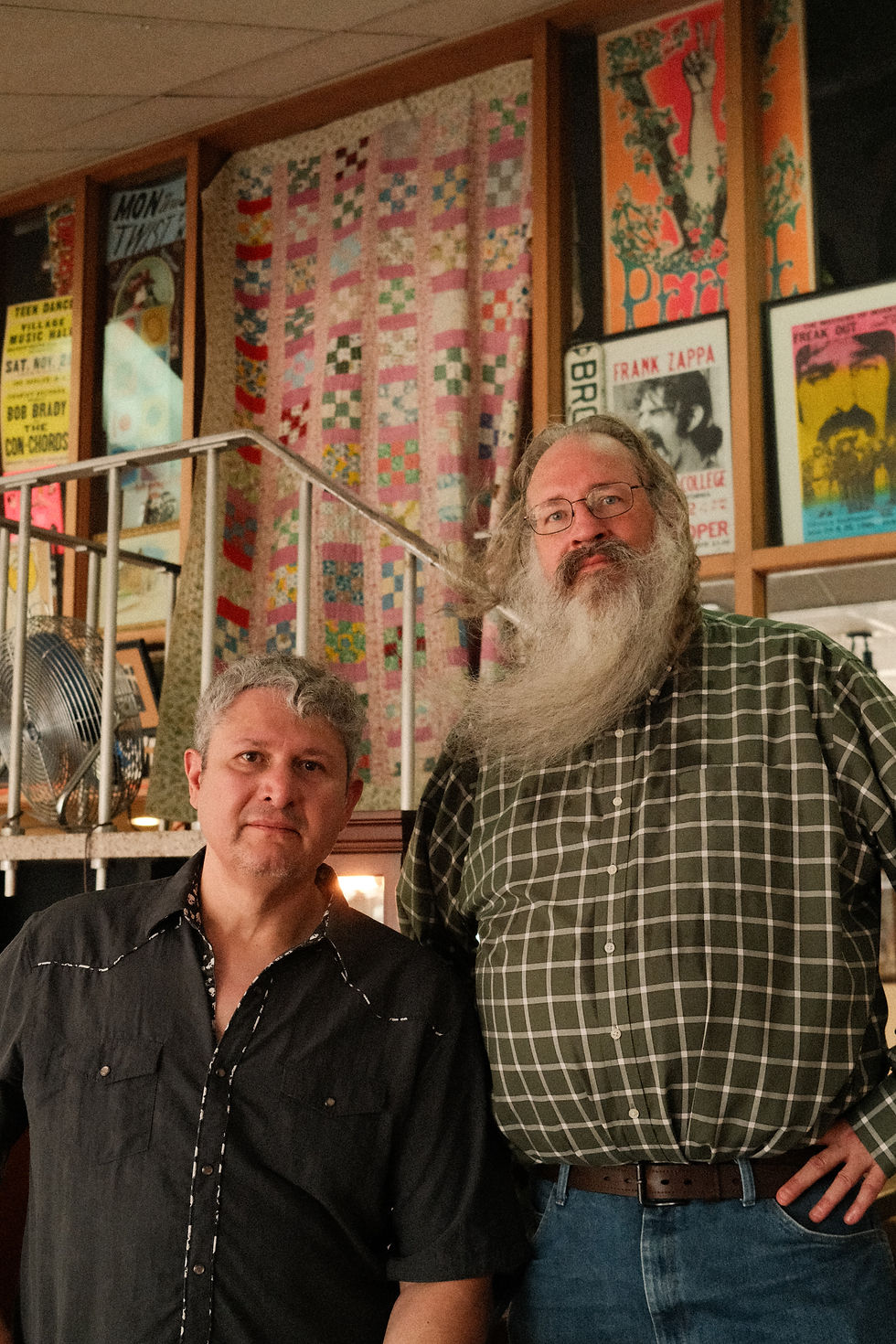
Nom De Plume’s new record Circle the Dream doesn’t waste time. The first thing you notice is how the acoustic guitar feels both intimate and expansive, almost like it’s being played in a small living room and a wide Wyoming field at the same time. Then the violin creeps in—warm, searching—and suddenly you’re in their world. It’s not flashy, but it doesn’t need to be. This is music that leans into subtleties and trusts the listener to catch them.
At the center of it all is Aris Karabelas, whose voice carries that kind of restless sincerity you can’t fake. He’s joined by bassist Michael Magee, who approaches his instrument more like an architect than a sideman, building foundations that twist and bend in unexpected ways. Together, they’ve crafted an album that feels lived-in, shaped by long drives, late-night sessions, and the kind of quiet reflection that only comes when you’re far from the noise of the industry.
The title track, “Circle the Dream,” is where the album’s tension sits. It’s about deciding whether to chase something that might never materialize or settle for the safer road. That’s not a new theme, but the way they frame it—acoustic strums underscored by violin lines that almost sound like second thoughts—is gripping. I kept replaying it, half because I was hooked, half because I couldn’t decide if it made me feel hopeful or exhausted. Probably both.
Then there’s “The Shadow,” which Rolling Stone Argentina already flagged as a standout. They weren’t wrong. It’s layered, almost experimental, with textures that feel more psychedelic than folk. But then you get “While My Eyes Gently Weep,” a stripped-back ballad that feels like it belongs to a different record entirely—bare, mournful, a little messy in a way that makes you lean closer. Nom De Plume clearly aren’t afraid of contradictions, and that’s part of what makes the album stick.
What struck me most is the way they use instrumentation to push against genre walls. A pedal steel shows up on “Fly,” but instead of delivering country twang, it bends into ghostly, almost unsettling tones. The saxophone, when it appears, doesn’t smooth things out—it complicates them. It’s the kind of detail that makes you think these guys aren’t chasing playlists; they’re building a world on their own terms.
And you can hear the geography in it too. This record was pieced together across Maryland and Wyoming, and there’s a sense of wide landscapes and shifting horizons baked into the songs. One moment, it’s intimate and confessional, the next it feels like a panoramic shot of the American West. That blend of closeness and distance, of personal struggle and big-sky freedom, is what gives Circle the Dream its weight.
By the end, you’re left with a record that doesn’t wrap things up neatly. It asks more questions than it answers, which honestly feels right. Nom De Plume aren’t interested in delivering anthems for easy consumption—they’re chasing something slipperier, something that circles and circles without landing. And as frustrating as that can be, it’s also what keeps you coming back. Circle the Dream is out today, and it’s one of those albums you’ll want to sit with, not just skim.
"Just a Guy with a Guitar and Something to Say"
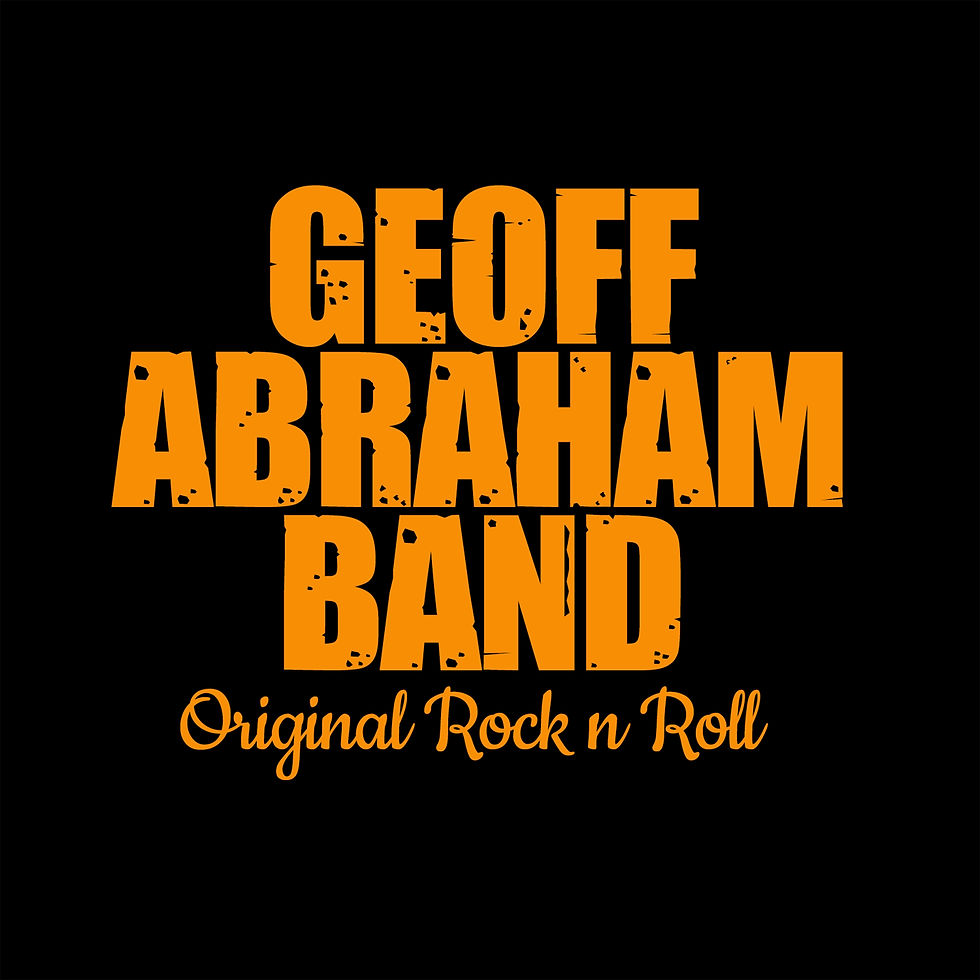
The first thing that hits you in “When Love Is At The Root” is the riff. It’s not trying to reinvent the wheel, and that’s the point. Geoff Abraham knows the weight a single guitar line can carry—how it can set the stage, cut through noise, and make you pay attention before a lyric even lands. It’s blues grit shot through with that loose-limbed swagger of Joe Walsh and Keith Richards. You can almost picture him smiling as the groove locks in.
Abraham isn’t fronting some faceless session outfit either. The Geoff Abraham Band has always been a bit of a moving target—a revolving door of players—but this track? It’s all him. Writing, producing, recording, mixing, playing. It’s the kind of one-man-band effort that could feel self-indulgent in lesser hands, but here it just feels intentional. You can hear the hours spent in his St. Petersburg home studio, chasing down the right tone until the song told him it was finished.
What I like most is that the track doesn’t hide behind big production tricks. The chorus lands because it’s singable, not because it’s over-polished. The message is simple: love as the foundation that keeps everything standing. It’s not groundbreaking philosophy, but it’s the kind of reminder that sneaks up on you. Especially now, when every headline feels designed to make us forget that idea. Abraham plants it right at the center of a rock song, and somehow it sticks.
His influences aren’t hard to trace. You can hear the Stones in the way the guitars lean and wobble, the Joe Bonamassa edge in the tone, and Marcus King’s soulfulness peeking through in the delivery. But this isn’t cosplay. Abraham’s been around too long—writing for other artists, landing tracks on NCIS and sports broadcasts, even penning a song for Greg Billings that pulled in Brian Johnson of AC/DC and Robin Zander of Cheap Trick. He’s not a kid trying to sound like his heroes. He’s an artist folding those flavors into his own recipe.
There’s a contradiction at play, too. Abraham can clearly write polished, commercial-ready tracks—he’s proven it with TV and ad placements. But when it comes to his own songs, he keeps circling back to this idea of serving the song. Not the market, not the moment, the song. You hear it in “When Love Is At The Root.” Nothing is wasted. No guitar solo running on too long, no lyric over-explaining itself. Just a track that knows what it’s about and gets out while you’re still nodding along.
The live side of this band is a whole other story. With a show booked at The Burren Backroom in Somerville this October, you get the sense that Abraham craves the looseness of a real stage, where songs breathe differently night to night. Studio control is one thing, but that Stones-inspired looseness doesn’t fully come alive until there’s sweat in the room and amps humming just a little too loud.
“It’s all about the song,” Abraham says. He repeats it often enough that it feels like both mantra and shield. And listening to this latest release, you believe him. There’s no flash, no reaching for trends, just a guy with a guitar, a hook, and something to say about holding onto the people who matter. Maybe that’s why the track lingers—it doesn’t try to convince you. It just reminds you.
"An Argument That Accidentally Turns Into a Singalong"
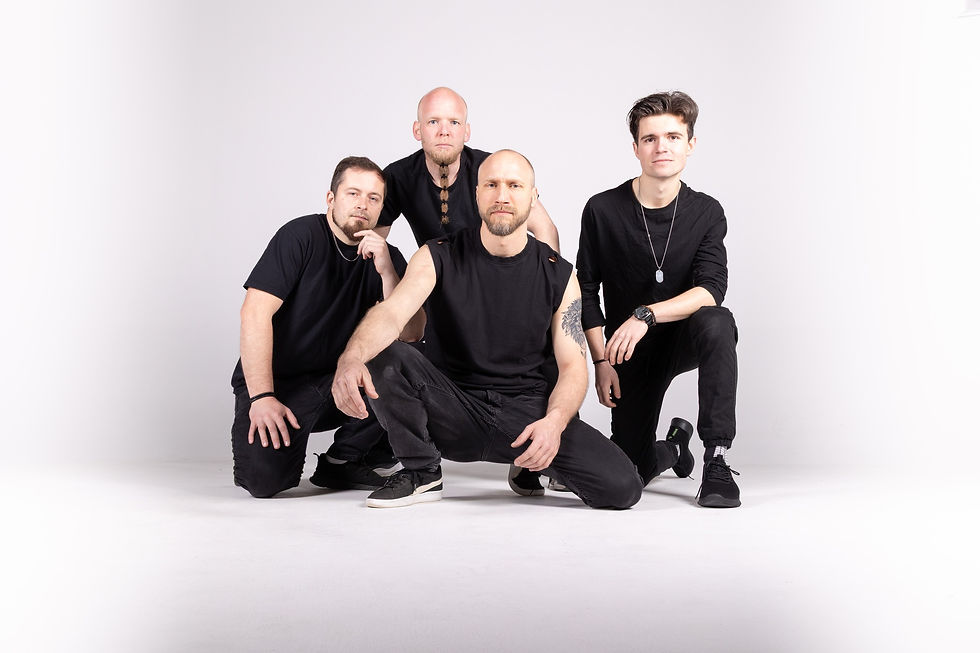
Palpitate don’t exactly ease you in. Their new single “Rebel” kicks down the door with a jagged riff and a rhythm section that sounds like it’s been sharpening knives in the rehearsal room. But then—almost unexpectedly—there’s space, a melodic pocket that opens up and lets the song breathe. That push and pull, aggression and melody, seems to be the band’s whole DNA.
The Czech four-piece have been grinding since 2018, when guitarist Milan Skřivánek and bassist Tomáš Holý decided they weren’t done after their old project Shockwave dissolved. Instead of chasing a safer sound, they doubled down. Palpitate became their outlet for something sharper, more restless, and maybe a little reckless. There’s a certain honesty in that—like they’re not trying to polish themselves into radio-friendliness, but also not afraid of weaving in hooks when it feels right.
When you trace their timeline, it feels like a band that’s been through enough stops and starts to understand persistence. First shows in 2020, their self-titled EP in 2021, lineup changes during the pandemic—it reads like the usual hurdles, but somehow you get the sense they thrive on the turbulence. The addition of guitarist Martin Švestka mid-COVID tightened the chemistry. Then, just as they found their stride, another shift: drummer Jan Eliáš stepping out and René Šalamoun stepping in at the end of 2024. That kind of turnover can kill momentum, but here it seems to have lit a fire.
I keep coming back to “Hypocrite,” the 2024 single before “Rebel.” It’s a track that doesn’t hide its teeth. Yet underneath the grit, there’s this unexpected clarity, like they’re aiming their anger with precision instead of just swinging wildly. That’s the thing with Palpitate: they make heavy music, sure, but it never collapses into noise. There’s always that melodic thread pulling you forward.
Live, they lean harder into the chaos. Fans in Prague and Brno talk about sweaty basement gigs where the setlist is secondary to the energy ricocheting around the room. Someone told me after one of their shows that Palpitate feels like “an argument that accidentally turns into a singalong.” Weird description, but it makes sense once you hear the crowd shouting back the chorus lines.
There’s also something disarmingly self-aware about them. The new single’s title, “Rebel,” could’ve been cliché in lesser hands. But Palpitate don’t romanticize rebellion—they treat it more like a natural impulse, sometimes messy, sometimes misguided, but occasionally necessary. That framing feels true to their story: a band that kept moving forward not because the path was clear, but because stopping wasn’t an option.
Where they go from here is the real question. “Rebel” already sounds bigger than their earlier stuff—leaner production, sharper edges, but also more room for the melodies to land. They’re still an underground act, but it’s not hard to imagine this track breaking past Czech borders. Palpitate feel like they’re standing at the edge of a next chapter. Not polished, not perfect—but maybe that’s the point.
"Working Fast and Loose"

The first thing you notice about The Stanchions’ new EP Ok Sounds! is how unforced it feels. It doesn’t sound like two brothers locking themselves away in a studio for months, overthinking every snare hit and guitar tone. It sounds like music that just… happened. And in a way, that’s exactly how it came together. The standout single, “Waiting At Home,” went from a rough idea to a finished track in just a few hours inside Brett’s home setup—fittingly named Lazy Polar Bear Studio. You can hear that spark in the recording. It’s loose, but locked in. Polished, but not too polished.
The Stanchions are Scott and Brett Mackey, two brothers from Surrey, Canada, who clearly share a wavelength when it comes to rock music. Scott handles songwriting, lyrics, and guitar, while Brett fills in the gaps on drums, bass, and rhythm guitar. Between them, they’ve built a full-band sound that doesn’t feel like it’s missing any pieces. There’s a chemistry here you can’t fake—probably because it’s been forming for years, between jam sessions, late-night writing bursts, and the kind of sibling shorthand that only brothers have.
Influence-wise, the Stanchions sit somewhere between the melodic grit of Seether and the punchy hooks of Green Day, though a couple of tracks on this EP lean further back, touching something more old-school. But here’s the thing: they’re not chasing a sound so much as finding their own within that lineage. When you listen through Ok Sounds!, you hear flashes of those influences, sure, but the songs are distinctly theirs. They’ve got that DIY edge without slipping into “garage band” territory.
What I like most is that this EP doesn’t feel weighed down by expectation. The band admits it came together faster than their previous releases, and that energy translates into the songs. There’s a looseness in the writing, a freedom that makes you think of the best kind of rock records—the ones that capture a moment instead of chasing perfection. And to be honest, that’s a breath of fresh air in an industry where overproduction can sometimes scrub the life out of a track.
One detail that stuck with me: Lazy Polar Bear Studio. The name alone feels almost too casual for a place where big-sounding rock songs are born. But maybe that’s the point. The Mackey brothers aren’t trying to project some massive rock-star image. They’re working out of a home studio, chasing ideas until they turn into songs, and then putting them out into the world. It’s approachable. It makes you root for them a little more.
Listening to Ok Sounds! straight through, I found myself circling back to “Waiting At Home,” partly because of the backstory, but mostly because it just sticks. The chorus lodges itself in your head without trying too hard, and the guitar tones have that perfect crunch—thick enough to carry weight but not so heavy they drown out the melody. It’s the kind of song you can imagine in a small venue, sweaty and loud, with the crowd shouting the hook back at them.
The Stanchions may still be under the radar, but Ok Sounds! feels like a turning point. There’s a confidence in these songs that makes you think the Mackey brothers are starting to really trust their instincts. And honestly, that’s when bands start to get interesting. If this is them working fast and loose, I can’t wait to see what happens when the rest of the world catches on.
"Don't Brake, Don't Slow Down"

MARS 999’s new single doesn’t kick down the door with volume or speed. Instead, V Zákrutách creeps in slowly, like headlights bending around a corner at midnight, and before you know it, you’re locked into its momentum. The title translates to “In the Curves,” but the real message is right there in the hook: don’t brake, don’t slow down—just hold your nerve and ride it out. It’s half dare, half confession.
The track was pieced together between Slovakia and Prague with producer Rohin Brown, then polished off in New York by mastering engineer Sarah Register (who’s worked with Big Thief and Protomartyr). That kind of transcontinental patchwork shows in the sound—lo-fi edges rubbing against dreamy guitar lines, vocals teetering between fragile and fearless. There’s something almost reckless about singing this kind of mantra in your native Slovak, knowing most listeners won’t understand the literal words, but trusting the emotion to land anyway. And it does.
Listening to V Zákrutách feels a little like being in on a secret. The beat isn’t urgent, but it keeps you moving forward, pulling you into this neon-lit swirl where nothing’s quite tidy. It reminded me of mk.gee’s warped pop sensibility colliding with John Frusciante’s more melodic wanderings. You can almost hear the studio air in the mix—tiny imperfections that give it personality, like the musical equivalent of a Polaroid that’s slightly overexposed but better for it.
The video leans right into that idea. Instead of glossy production, MARS 999 stitched together fan-submitted clips with his own flashes of carnival rides, streetlights, and blurry nights. It’s chaotic but charming—the kind of footage you’d find in a friend’s phone gallery at 3 a.m., strung together into something that feels bigger than the sum of its parts. There’s no narrative, really. Just glimpses of life moving too fast to pin down, which fits the whole “don’t brake” philosophy perfectly.
What I like about MARS 999 is that he’s not afraid of contradiction. The music is delicate, almost hesitant at times, but the lyrics are pure bravado. The visuals look accidental but are clearly curated. Even his choice to sing only in Slovak makes the whole project feel both niche and universal at once. It’s like he’s saying: this is my corner of the world, and you’re welcome to step into it—but I’m not going to translate myself for you.
There’s also something refreshing about an artist who’s not trying to sound “international” just for the sake of it. The song doesn’t lean on clichés to feel global—it just is. That’s probably why V Zákrutách could sit comfortably on the same playlist as Bon Iver or an underground Tokyo dream-pop act without feeling out of place. It carries that intangible quality you can’t fake: a sense of urgency that’s more emotional than sonic.
MARS 999 says the track is for anyone tired of playing safe, and it’s hard not to take him at his word. V Zákrutách is more than a single; it feels like a mission statement for an upcoming debut album that might just push Slovak indie onto more people’s radar. If this is the warm-up lap, the full race should be worth sticking around for.
"Crashing the Pool Party"
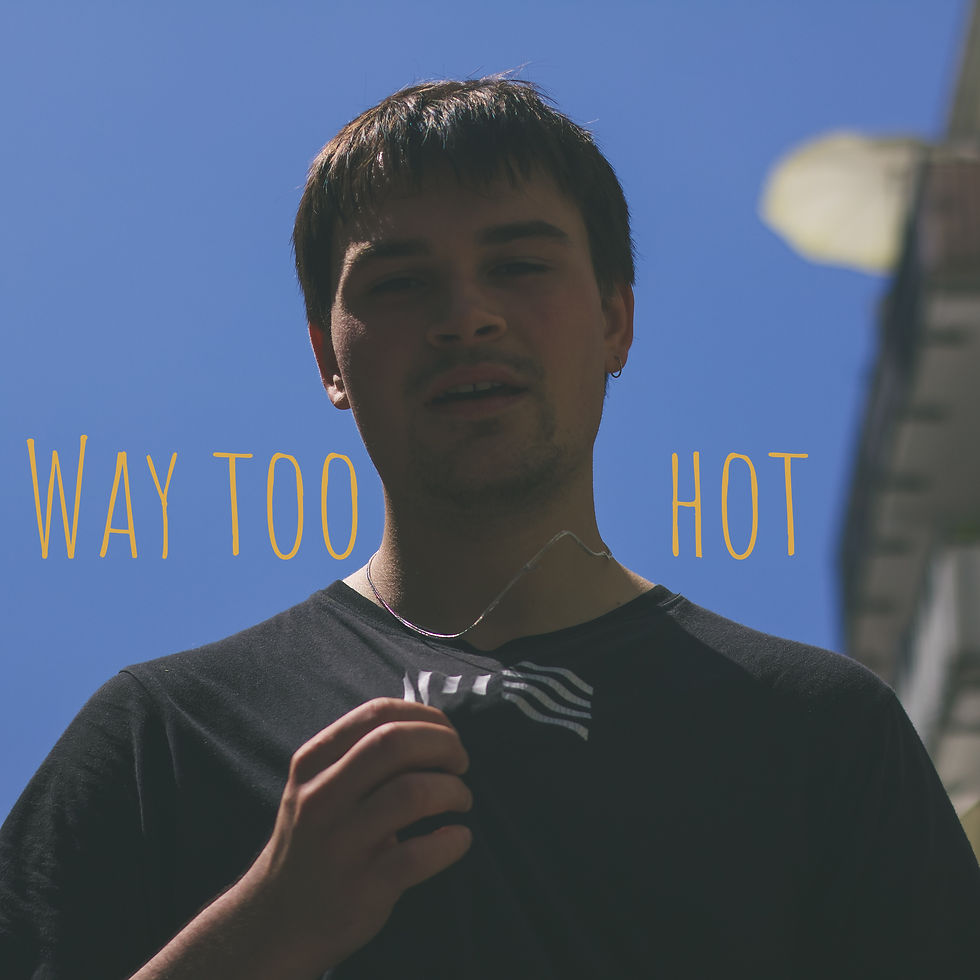
Zukrassverliebt doesn’t tiptoe into a song—he jumps in, feet first, like someone crashing a pool party in July. His latest single Way Too Hot (“Viel zu heiß”) is a glossy, sunburnt reminder that sometimes music doesn’t need to solve the world’s problems to feel important. It just needs to make you move. And this one? It’s practically engineered for sweat-soaked dancefloors and balconies buzzing with cheap beer and bad decisions.
The track leans heavy on Caribbean rhythms—syncopated beats that practically dare you not to sway. Then there’s that hook, so sticky it feels less like a chorus and more like a dare. By the second spin, I caught myself humming it while waiting in line for coffee. That’s the kind of earworm power we don’t admit we love but secretly crave.
What I like is how playful the whole thing is. Zukrassverliebt isn’t pretending to reinvent pop. He’s laughing with us, not at us. The lyrics toy with attraction as if it’s both too much and not enough, wrapping it all up in heatwave metaphors that feel timely in a world that’s constantly burning—sometimes literally, sometimes metaphorically. It’s cheeky escapism, but not empty. There’s a wink in every bar.
I also appreciate that he doesn’t bury the vocals under production. The beat is loud, sure, but his delivery cuts right through, cheeky and almost conversational. It makes you feel like he’s talking directly to you on the dancefloor, pointing across the room at someone who just made your heart stutter. Pop can be bloated with overproduction; this feels like it knows exactly how much is enough.
There’s also something strangely grounding about the humor. He’s not afraid to poke fun at the absurdity of desire, the way attraction can feel both unstoppable and ridiculous. That balance—the push-pull between heat and humor—makes the track more memorable than it has any right to be. And honestly, it’s refreshing in a market where so many dance-pop songs blur together.
Listening to Way Too Hot a few times in a row, I started imagining its inevitable festival moment: sweat-dripping crowds, inflatable flamingos tossed overhead, that chorus breaking out in unison. It’s made for TikTok dances, sure, but also for DJs who know the exact point in the night when people stop pretending they’re not there to dance.
Zukrassverliebt may not yet be a household name outside certain scenes, but tracks like this are how it starts. You slip into playlists, then house parties, then suddenly you’re that song people can’t quite place but everyone knows. If Way Too Hot is the template, then his next moves are going to be fun to watch.
"Still Deep in the Process"
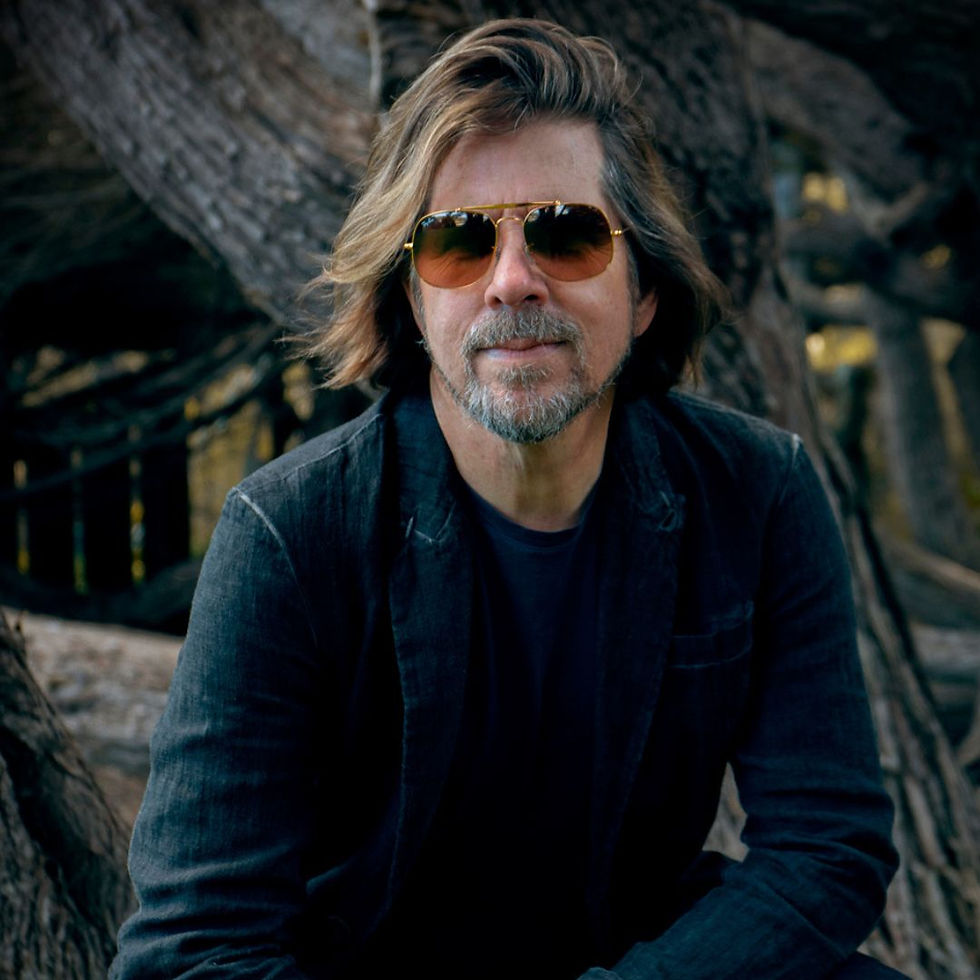
Forrest Hill doesn’t sound like someone chasing trends. His new record Beyond The Veil feels more like a conversation he’s been having with himself for decades—one he’s finally ready to invite us into. It’s folk-rock at its core, but there are shades of psychedelia and indie shimmer that nod to bands like The Shins and The War On Drugs. The result isn’t retro, but it’s not afraid of being timeless either.
What caught me first wasn’t even the production—it was his songwriting. Tracks like “Another Day” and “Still Believe” dive into messy, uncomfortable questions about ego and identity without getting preachy. Then there’s “Can’t Wait For a Savior,” which takes on climate change and division in a way that’s startlingly direct. He’s not wagging a finger, though. Hill frames it with personal responsibility—almost like he’s asking, “What am I willing to do?” and letting us wrestle with the same.
If that makes the album sound heavy, it’s not. There’s this sense of lift in the melodies, especially in songs like “Psilocybin.” That one’s a standout: part confessional, part trip diary, part testimony to music’s weird ability to help us process trauma. It’s brave, sure, but it’s also strangely playful. I found myself replaying it just to catch the little sonic details J. Christopher Thomas tucked into the mix. This is their third collaboration, and you can tell—the trust between them lets the songs stretch into unexpected spaces.
Hill’s path here isn’t straightforward. Back in Boston, he was fronting Judy’s Tiny Head, opening for Violent Femmes, Run DMC, even Aimee Mann. Then he went and got a PhD from MIT. (Yeah, not your typical rock frontman move.) By the time he landed in Oakland in the early 2000s, his focus had shifted. Meditation, introspection, less posturing, more peeling back layers. That’s when this second chapter really began. Beyond The Veil feels like the clearest synthesis of those worlds—scientist precision, bandleader energy, seeker’s openness.
I’ll be honest: sometimes artists who’ve been at it this long fall back on muscle memory. Hill doesn’t. There’s a restlessness here, a willingness to risk alienating his old fans by following his gut. I respect that. It’s not easy to keep evolving when you already know how to write a “safe” song that works. He’s chosen not to play it safe.
Critics have already compared him to Paul Simon, Gregory Alan Isakov, Alexi Murdoch. Fair enough—you hear flashes of that DNA. But there’s also something scrappier, maybe a holdover from his funk-rock band days. You’ll be listening to a delicate acoustic moment and suddenly there’s this rhythmic punch that reminds you he once shared bills with Run DMC. Contradictions like that keep the album alive.
What Beyond The Veil ultimately proves is that Forrest Hill isn’t finished searching. Six albums in, he’s still willing to ask uncomfortable questions and chase sounds that don’t fit neatly into genre boxes. For listeners, that’s the payoff—you’re not just getting songs, you’re getting an artist still deep in the process of figuring things out. And honestly, that’s way more interesting than someone who claims to have all the answers.





Comments